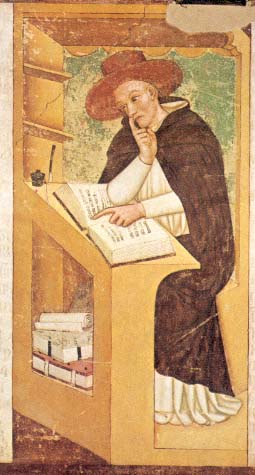Robert Kilwardby facts for kids
Quick facts for kids His Eminence Robert Kilwardby OP |
|
|---|---|
| Cardinal, Archbishop of Canterbury Primate of All England |
|
 |
|
| Appointed | 11 October 1272 |
| Reign ended | 5 June 1278 |
| Predecessor | William Chillenden |
| Successor | Robert Burnell |
| Other posts | Cardinal Bishop of Porto and Santa Rufina |
| Orders | |
| Consecration | 26 February 1273 by William of Bitton (II.) |
| Created Cardinal | 12 March 1278 |
| Rank | Cardinal bishop |
| Personal details | |
| Born | c. 1215 England |
| Died | 11 September 1279 Viterbo |
| Buried | Dominican convent, Viterbo |
| Education | University of Paris |
Robert Kilwardby (born around 1215 – died September 11, 1279) was an important leader in the Catholic Church during the 13th century. He served as the Archbishop of Canterbury in England, which was a very high position. Later, he became a Cardinal, another top role in the Church. Kilwardby was the first person from a mendicant order (like the Dominicans, who lived simply and helped others) to reach such a high church office in England.
Contents
Robert Kilwardby's Life
Early Life and Education
Robert Kilwardby began his studies at the famous University of Paris. There, he became a teacher of grammar and logic, which are subjects about language and clear thinking.
Later, he joined the Dominican Order, a group of priests and brothers who dedicated their lives to teaching and helping people. He then studied theology, which is the study of religious faith. Before 1261, and possibly as early as 1245, he became a leader at Oxford University.
Becoming Archbishop
In 1261, Kilwardby was chosen to be the main leader for the Dominicans in England. Then, in October 1272, Pope Gregory X picked him to be the Archbishop of Canterbury. This decision helped to settle a disagreement about who should be the next archbishop.
Kilwardby officially took on the role of archbishop on October 11, 1272. He was given control of the church's lands and money on December 12, 1272, and was formally made archbishop on February 26, 1273.
A Leader for England
In August 1274, Kilwardby had the important job of crowning Edward I and his wife Eleanor as the new king and queen of England. After that, he mostly focused on his church duties. He spent his time helping the poor and giving money to the Dominicans. He did not get very involved in politics.
Moving to Italy
In 1278, Pope Nicholas III gave Kilwardby an even higher position. He was named a Cardinal Bishop of Porto and Santa Rufina, which meant he had to move to Italy. Because of this, he resigned from his role as Archbishop of Canterbury and left England.
When he left, he took many important papers and records that belonged to the Canterbury church. His departure also left the church in debt again, even though the previous archbishop had worked hard to clear its debts. Kilwardby passed away in Italy in 1279 and was buried in a Dominican church in Viterbo, Italy.
While becoming a cardinal was a promotion, some people believe the Pope was not entirely happy with Kilwardby. This was because Kilwardby had supported efforts to avoid paying certain church taxes to the Pope. He also didn't seem to push hard enough for some changes that were asked for at a big church meeting called the Second Council of Lyon in 1274.
His Ideas and Writings
Robert Kilwardby was known for his ideas in theology and philosophy. A scholar named David Knowles described him as someone who held onto older ideas while also accepting some new ones. He believed in certain natural forces that guide development and disagreed with some of the new ideas from the famous philosopher Aristotle.
Some people thought Kilwardby wrote a book called Summa Philosophiae, which was a history of different philosophical ideas. However, the writing style of that book is different from his other works, so many scholars don't believe he wrote it.
It has also been said that Kilwardby was against the teachings of Thomas Aquinas, another very important thinker. In 1277, Kilwardby banned the teaching of thirty specific ideas, some of which were thought to be related to Thomas Aquinas's teachings. However, more recent scholars have questioned this idea, suggesting it might not be true.
Robert Kilwardby's Works
Kilwardby wrote many books and commentaries on different subjects.
- Writings on Grammar: He wrote a detailed commentary on parts of Priscian's Institutiones grammaticae, which was a major book about Latin grammar.
- Writings on Logic: He wrote several notes and commentaries on books by Aristotle and other thinkers about logic, which is the study of correct reasoning. These include Notulae super librum Praedicamentorum and Comentum super librum Topicorum.
- Writings on Natural Philosophy: He also wrote about natural philosophy, which was an early form of science. Two of his works in this area are De spiritu fantastico and De tempore.
- Writings on Ethics: Kilwardby wrote about ethics, which is the study of moral principles. His works include Quaestiones supra libros Ethicorum and several Quaestiones (questions) on the Sentences, a famous theological text. He also wrote De ortu scientiarum, about the origin of knowledge.
One of his books, De tempore, has been translated into English. Another important work, De orto scientiarum, was published as a critical edition in 1976.
Kilwardby also created a helpful summary of the writings of the early Church Fathers. This work, called Tabulae super Originalia Patrum, arranged their ideas in alphabetical order.
 | Precious Adams |
 | Lauren Anderson |
 | Janet Collins |

